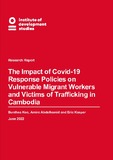| dc.contributor.author | Keo, Bunthea | |
| dc.contributor.author | Abdelhamid, Amira | |
| dc.contributor.author | Kasper, Eric | |
| dc.coverage.spatial | Cambodia | en |
| dc.date.accessioned | 2022-06-27T10:48:50Z | |
| dc.date.available | 2022-06-27T10:48:50Z | |
| dc.date.issued | 2022-06-27 | |
| dc.identifier.citation | Keo, B.; Abdelhamid, A. and Kasper, E. (2022) The Impact of Covid-19 Response Policies on Vulnerable Migrant Workers and Victims of Trafficking in Cambodia, Brighton: Institute of Development Studies, DOI: 10.19088/CC.2022.002 | en |
| dc.identifier.uri | https://opendocs.ids.ac.uk/opendocs/handle/20.500.12413/17499 | |
| dc.description.abstract | To date, the Government of Cambodia has issued at least 2,216 policies in response to Covid-19. These have largely been directed at limiting the spread of the Covid-19 within Cambodia, with clear attempts to mitigate the burden on economically- and socially-vulnerable groups. This study explored the ways in which the policy response to Covid-19 has been experienced by vulnerable migrant workers and people vulnerable to trafficking in persons. We interviewed seven social workers and independent experts, four migrant workers, and nine survivors of trafficking in order to gather evidence about gaps in the policies’ abilities to protect people and to identify mechanisms by which they impacted vulnerability.
We find that, while the policies have attempted to provide protection to vulnerable groups, the majority of our respondents were not able to access it effectively. Workers in informal sectors have been particularly impacted by work stoppages since they have less bargaining power with employers and are much less able to access government unemployment support. Migrant workers trapped abroad faced hardships and discrimination, with many making risky journeys back to Cambodia or losing their regular migrant status. Border closure policies meant that many people were not able to safely return to Cambodia or travel for their livelihoods. This resulted in an increased reliance on brokers to cross borders illegally and to attempt to find work, which in turn increased risks of exploitation and trafficking at the very time when officials and non-governmental organisations (NGOs) were least able to monitor and identify violations. | en |
| dc.language.iso | en | en |
| dc.publisher | Institute of Development Studies | en |
| dc.rights | It is licensed for non-commercial purposes only. Except where otherwise stated, it is licensed for non-commercial purposes under the terms of the Open Government Licence v3.0. Covid Collective cannot be held responsible for errors, omissions or any consequences arising from the use of information contained. Any views and opinions expressed do not necessarily reflect those of FCDO, Covid Collective or any other contributing organisation. | en |
| dc.rights.uri | https://www.nationalarchives.gov.uk/doc/open-government-licence/version/3/ | en |
| dc.subject | Migration | en |
| dc.subject | Work and Labour | en |
| dc.title | The Impact of Covid-19 Response Policies on Vulnerable Migrant Workers and Victims of Trafficking in Cambodia | en |
| dc.type | Other | en |
| dc.rights.holder | Institute of Development Studies | en |
| dc.identifier.doi | 10.19088/CC.2022.002 | |
| rioxxterms.funder | Default funder | en |
| rioxxterms.identifier.project | Covid Collective | en |
| rioxxterms.version | VoR | en |
| rioxxterms.versionofrecord | 10.19088/CC.2022.002 | en |
| rioxxterms.funder.project | 15a658e8-70b7-4d70-a299-f35d442f3170 | en |

